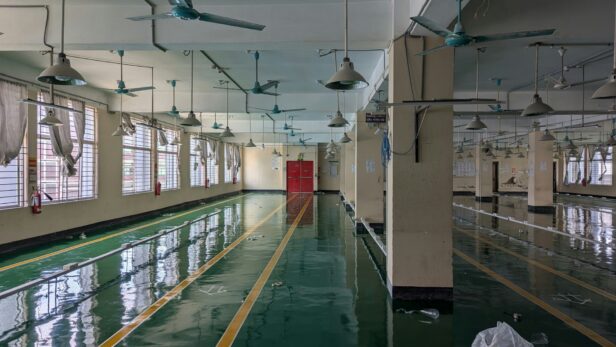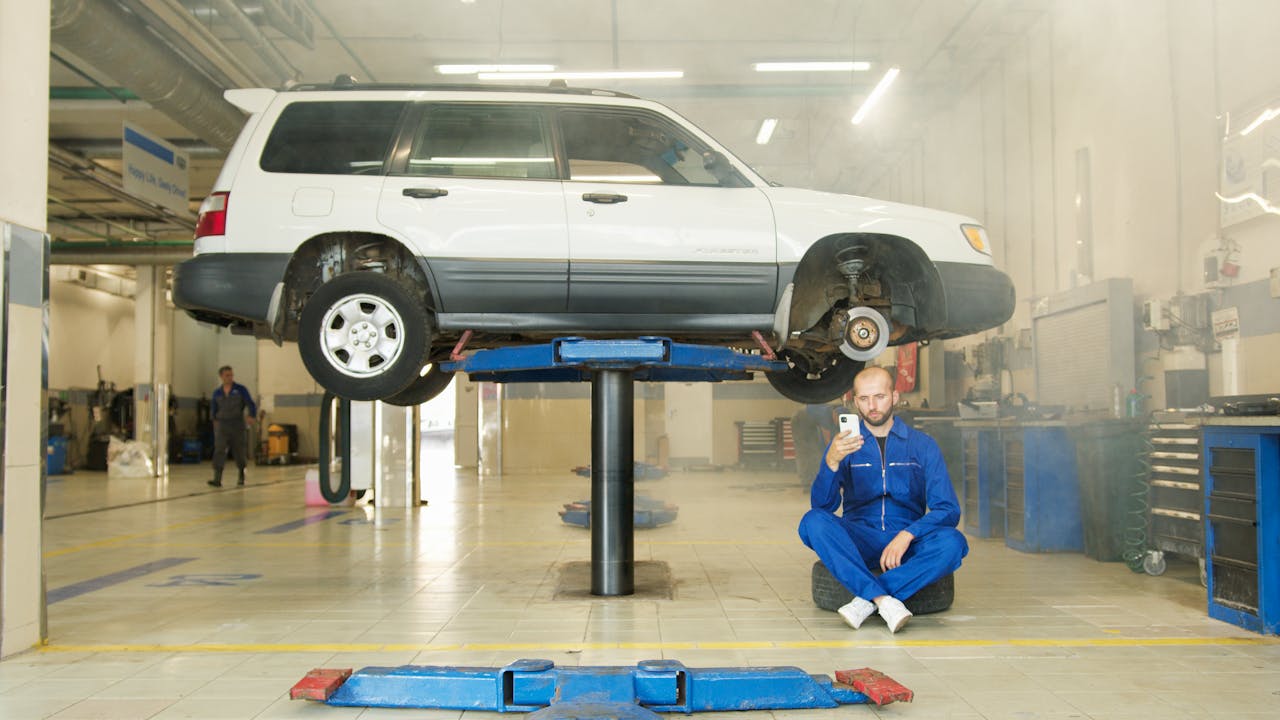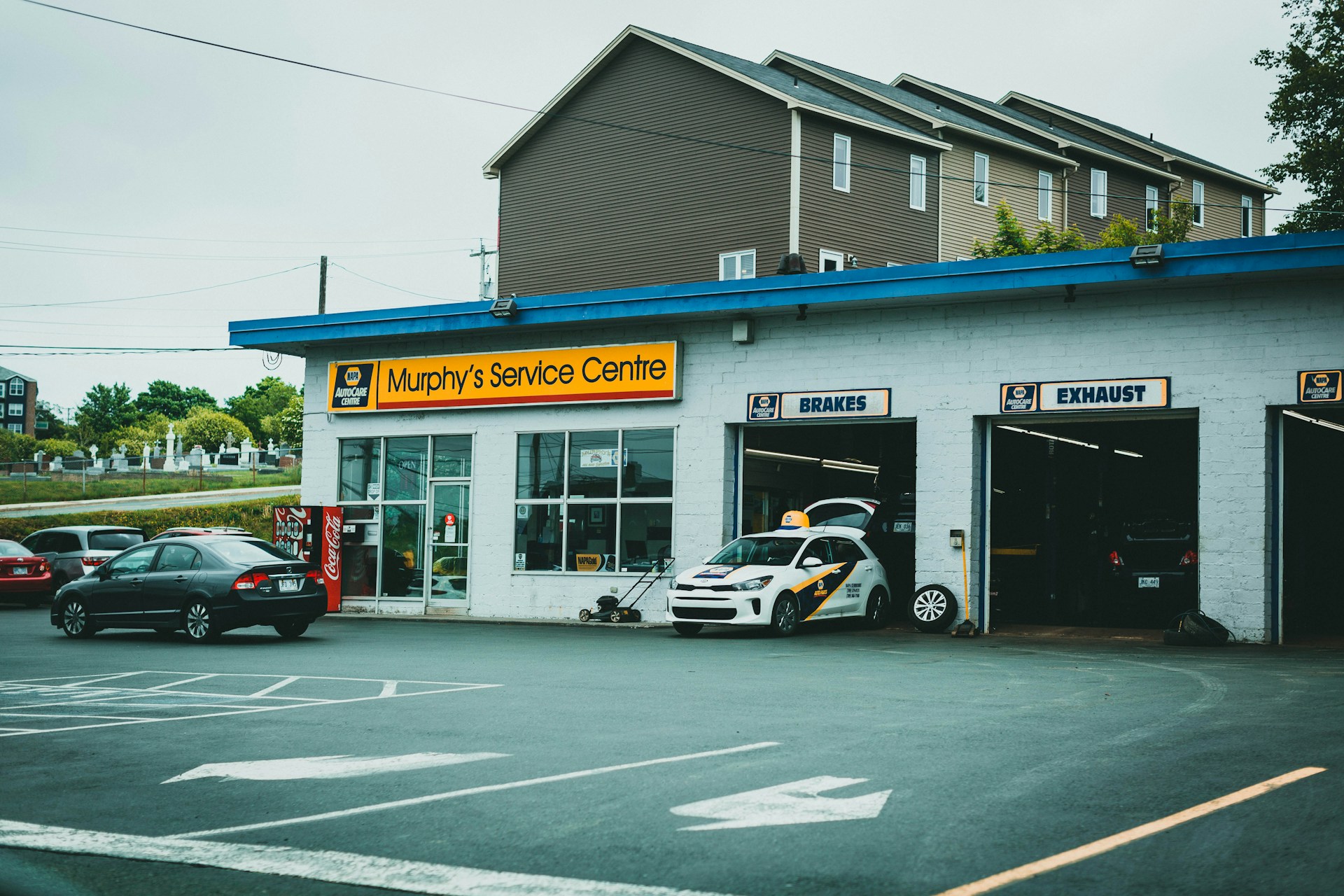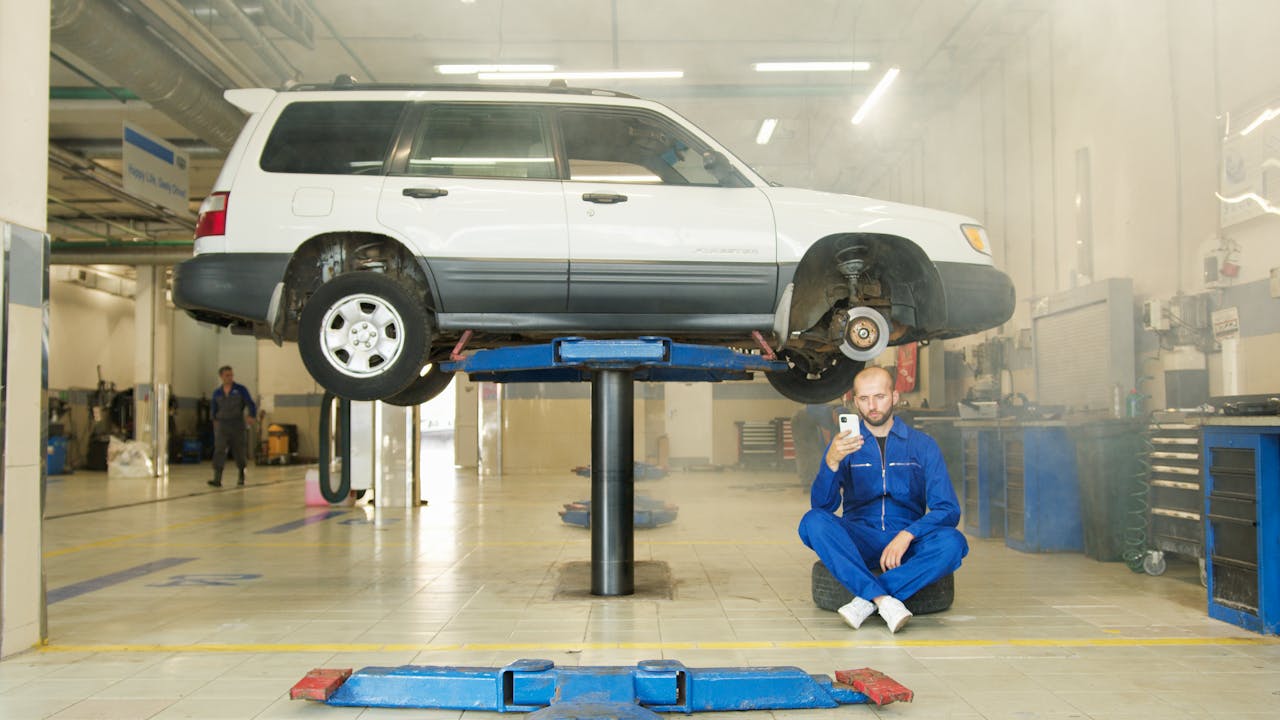Epoxy flooring has become the preferred choice for commercial workshops seeking a comprehensive flooring solution. We install epoxy coatings that offer an ideal blend of durability, functionality, and visual appeal. For automotive repair shops, manufacturing plants, and other high-traffic industrial spaces, epoxy flooring provides practical benefits that ensure long-term value.
This unique formulation creates an exceptionally strong and resilient surface, capable of enduring the constant demands of heavy machinery, chemical spills, impacts, and foot traffic typical in busy workshop environments. Additionally, epoxy flooring offers extensive customization options, allowing us to tailor the color, finish, and design to align with your branding or designate specific work zones.
Crucially for commercial operations, epoxy flooring is a cost-effective investment. Its longevity and low maintenance requirements result in reduced downtime and replacement costs over time. For workshop owners focused on cost-efficiency, epoxy delivers exceptional performance without substantial expense.
What Are the Key Benefits of Epoxy Flooring in Workshop Environments?

In workshop settings, epoxy flooring provides distinct advantages perfectly suited to these demanding environments. Our epoxy solutions offer a robust foundation capable of enduring the rigors of daily operations while enhancing safety and efficiency. Let’s explore the key benefits that make epoxy flooring an ideal choice for workshops:
Exceptional Durability
Our epoxy floors are designed to withstand the constant wear typical in workshops. The hardened surface resists impacts from dropped tools, heavy equipment traffic, and frequent foot traffic without chipping or cracking. This durability leads to reduced maintenance costs and longer intervals between floor replacements.
Chemical Resistance
Workshops often handle harsh chemicals that can degrade standard flooring materials. Our epoxy coatings create a protective barrier against oils, grease, acids, solvents, and other corrosive substances common in these spaces. This resistance not only preserves the floor’s integrity but also simplifies spill cleanup, reducing potential hazards.
Customizable Safety Features
Safety is crucial in any workshop, and our epoxy flooring systems can be tailored to enhance workplace security. We incorporate anti-slip additives to create a textured surface that maintains traction even when wet, significantly reducing the risk of slips and falls. Additionally, we can integrate safety lines and demarcation zones directly into the flooring to clearly define work areas and traffic paths.
Easy Maintenance
The seamless, non-porous nature of epoxy flooring makes it exceptionally easy to clean and maintain. Unlike concrete or tiled surfaces, there are no joints or grout lines where dirt and grime can accumulate. Regular sweeping and occasional mopping are usually sufficient to keep the floor looking pristine, saving time and labor costs associated with floor maintenance.
Enhanced Visibility
Our high-gloss epoxy finishes significantly improve light reflection in workshop spaces. This enhanced brightness can improve visibility throughout the area, potentially reducing the need for additional lighting and lowering energy costs. Better visibility also contributes to a safer work environment by reducing eye strain and helping to prevent accidents.
Moisture Resistance
Workshops often face moisture issues, whether from spills, cleaning, or environmental factors. Our epoxy flooring creates a waterproof barrier that protects the underlying concrete from moisture penetration. This not only preserves the structural integrity of the floor but also helps prevent the growth of mold and mildew, maintaining a healthier work environment.
By implementing epoxy flooring in workshop environments, businesses can create a safer, more efficient, and visually appealing workspace. The long-term durability and reduced maintenance requirements make it a cost-effective solution that continues to deliver value year after year.
| Feature | Epoxy Flooring | Traditional Flooring (Concrete, Hardwood, Tile, etc.) |
|---|---|---|
| Durability | Highly durable, withstands heavy machinery, impacts, and foot traffic | Varies; concrete durable but can crack, hardwood can scratch, tile can crack |
| Chemical Resistance | Resistant to oils, grease, acids, solvents | Varies; generally not resistant like epoxy |
| Maintenance | Low maintenance, easy to clean | Higher maintenance, requires regular care |
| Safety | Customizable for non-slip surfaces | Potentially slippery, varies based on material |
| Aesthetic Appeal | Customizable colors and finishes | Limited to natural materials and design options |
| Longevity | 10–20 years or more with proper care | Varies; hardwood can last decades but needs refinishing |
| Cost-Effectiveness | Cost-effective long-term, due to durability and low maintenance | Potentially higher long-term costs due to repairs and replacements |
When considering flooring options for your workshop, it’s clear that epoxy offers significant advantages over traditional materials. Its combination of durability, safety features, and ease of maintenance makes it an ideal choice for businesses looking to optimize their workspace while managing long-term costs effectively.
What Types of Epoxy Flooring Systems Work Best for Workshops?
When outfitting a commercial workshop with durable flooring, several epoxy systems emerge as top choices. The ideal selection depends on the specific activities, traffic patterns, and potential exposures in your workspace. Let’s examine some of the most effective epoxy flooring options for workshop environments:
Self-Leveling Epoxy Systems
For general workshop areas, self-leveling epoxy creates a smooth, seamless surface that’s both functional and attractive. This system flows into place, filling minor imperfections in the concrete substrate. The result is a glossy, easy-to-clean floor that resists stains and withstands foot traffic and light vehicle use. Self-leveling epoxy is an excellent all-purpose choice for many workshop applications.
Mortar Epoxy Systems
In areas where heavy machinery operates or tools are frequently dropped, mortar epoxy systems offer superior protection. These ultra-durable floors incorporate aggregate materials into a thick epoxy base, dramatically increasing impact and abrasion resistance. While not as smooth as self-leveling options, mortar systems can handle extreme wear and tear, making them ideal for high-stress zones in industrial workshops.
Chemical-Resistant Formulations
Automotive and manufacturing workshops often deal with harsh chemicals that can quickly degrade standard flooring. For these environments, chemical-resistant epoxy formulations are recommended. These specialized systems create a robust barrier against oils, fuels, solvents, and other corrosive substances. By protecting the underlying concrete, chemical-resistant epoxy extends the life of your workshop floor and maintains a safe, clean workspace.
Anti-Static Epoxy Systems
Workshops that handle electronic components or flammable materials require extra precautions against static electricity buildup. Anti-static epoxy systems incorporate conductive materials to safely dissipate static charges. This critical feature helps protect sensitive equipment and reduces the risk of spark-induced fires or explosions. For electronics manufacturing or chemical processing areas, anti-static epoxy is an essential safety measure.
Choosing the Right System for Your Workshop
Selecting the optimal epoxy flooring system involves carefully assessing your workshop’s unique needs. Consider factors such as:
- Types of activities performed
- Expected foot and vehicle traffic
- Exposure to chemicals or corrosive substances
- Likelihood of impacts from dropped tools or equipment
- Presence of static-sensitive materials or processes
By evaluating these aspects, you can identify which epoxy system – or combination of systems – will best protect your workshop floor while supporting productivity and safety.
Remember, proper surface preparation and professional installation are crucial for maximizing the performance and longevity of any epoxy flooring system. Working with experienced contractors ensures your workshop gets a durable, long-lasting floor that can handle your toughest challenges.
How Is Epoxy Flooring Installed in Commercial Workshops?
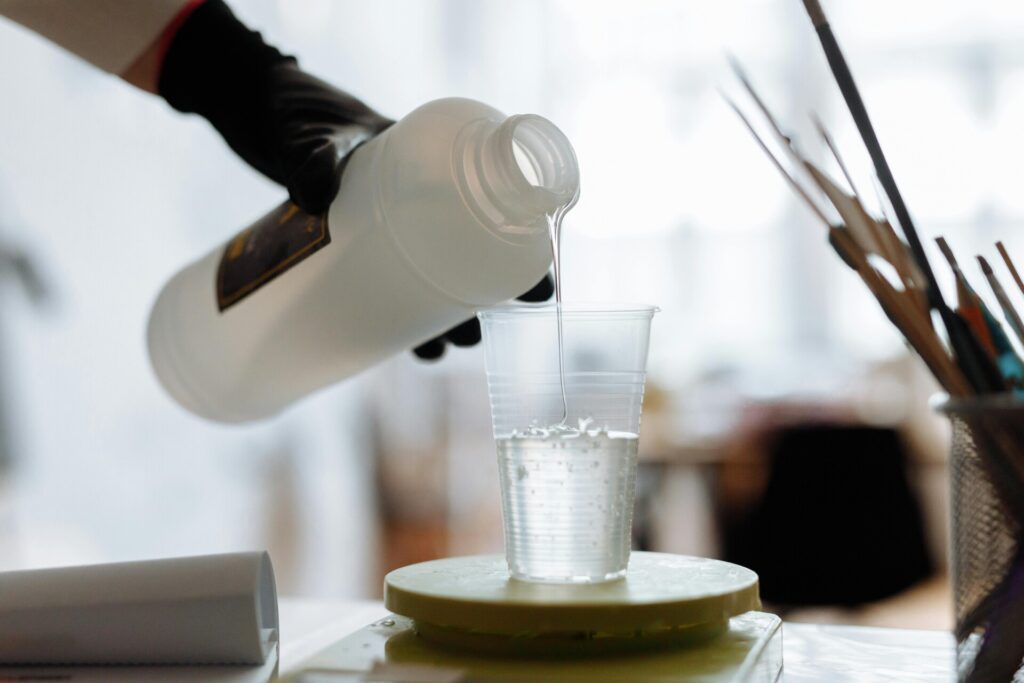
Installing epoxy flooring in commercial workshops requires careful preparation and application to ensure a durable, long-lasting surface. Here are the key steps involved in this process:
Substrate Inspection and Testing
Before work begins, we conduct a thorough inspection of the concrete substrate. This includes testing for moisture content, checking for cracks or damage, and assessing the overall condition of the floor. Understanding the state of the concrete helps us determine if any repairs are needed and informs our approach to surface preparation.
Surface Preparation
Proper surface preparation is critical for epoxy adhesion. We typically use mechanical methods like diamond grinding to create the ideal profile for the epoxy to bond with. This step removes any existing coatings, smooths out imperfections, and opens up the pores of the concrete. It’s a dusty process, but specialized equipment minimizes airborne particles in the workshop environment.
Priming the Surface
Once the floor is prepped, we apply a primer coat. This helps seal the concrete and provides an additional bonding layer for the epoxy. The type of primer used depends on the specific epoxy system and the condition of the concrete.
Epoxy Application
With the primer in place, we mix and apply the epoxy coating. For workshop floors, we often incorporate aggregates or chips broadcast into the wet epoxy to provide slip resistance and durability. Multiple layers may be applied depending on the desired thickness and performance requirements of the floor.
Curing Time
After application, the epoxy needs time to cure properly. This typically takes 24-72 hours, depending on the specific product and environmental conditions. We work with our clients to schedule installation during off-hours or weekends to minimize disruption to workshop operations.
Final Inspection and Handover
Once fully cured, we conduct a final inspection to ensure the floor meets quality standards. We then provide guidance on care and maintenance to help preserve the floor’s appearance and performance over time.
While DIY epoxy kits are available, we strongly recommend professional installation for commercial workshops. The demands on these floors require expert application to ensure durability, chemical resistance, and proper performance. Our team has the specialized equipment and expertise to handle the unique challenges of workshop environments, from dealing with oil-soaked concrete to creating custom anti-slip surfaces for specific work areas.
By following this careful process, we create epoxy floors that can withstand the rigors of daily workshop use while providing a clean, professional appearance that enhances the overall work environment.
What Maintenance Do Workshop Epoxy Floors Require?
We’ve found that epoxy flooring in commercial workshops requires minimal upkeep to maintain its durability and appearance. Our experience shows that a simple maintenance routine goes a long way in preserving these robust surfaces.
Regular cleaning forms the foundation of epoxy floor care in workshop settings. We recommend daily sweeping or dust mopping to remove abrasive debris that can scratch the surface over time. For more thorough cleaning, we advise mopping weekly with warm water and a pH-neutral cleaner specifically formulated for epoxy floors. Harsh chemicals or acidic solutions should be avoided, as they can degrade the epoxy’s protective qualities.
In busy workshops where oil, grease, or chemical spills are common, prompt cleanup is crucial. We emphasize the importance of addressing spills immediately to prevent staining or etching of the epoxy surface. For stubborn oil residues, we’ve found that periodic degreasing with a commercial-grade degreaser, followed by a thorough rinse, effectively maintains the floor’s slip resistance and visual appeal.
One of the major advantages we’ve observed with epoxy flooring is its low-maintenance nature compared to traditional flooring options. Unlike concrete or tile, epoxy doesn’t require waxing, polishing, or sealing. This translates to significant time and cost savings for workshop operators over the long term.
With proper care, we’ve seen workshop epoxy floors maintain their performance and aesthetics for 10-20 years. This longevity makes epoxy a cost-effective flooring solution for commercial and industrial spaces. However, it’s important to note that even the most durable epoxy floors may eventually show signs of wear in high-traffic areas.
When minor wear does occur, we often recommend rejuvenation rather than replacement. In many cases, applying a new topcoat can restore the floor’s protective properties and appearance without the need for a complete overhaul. This approach extends the life of the flooring system while minimizing disruption to workshop operations.
By implementing these straightforward maintenance practices, workshop owners can ensure their epoxy floors continue to provide a safe, attractive, and highly functional surface for years to come. The key is consistency in care and promptly addressing any issues that arise.
| Task | Frequency | Description |
|---|---|---|
| Mopping | Daily | Use a soft-bristle broom or microfiber dust mop to remove debris. |
| Cleaning with pH-neutral solution | Weekly | Mop with warm water and a pH-neutral cleaner specifically for epoxy floors. |
| Inspect for Damage | Monthly | Check for signs of damage such as chips and excessive wear. |
| Spot-Clean Spills | Immediately | Blot spills with a soft cloth or towel, then clean with a damp mop and pH-neutral cleaner. |
| Deep Cleaning | Quarterly | Move equipment and deep clean the surface, especially in high-traffic and industrial areas. |
| Apply New Topcoat (as needed) | Every 10-20 years | Rejuvenate the floor with a new topcoat to restore protective properties and appearance. |
While epoxy flooring is indeed low-maintenance, it’s not entirely maintenance-free. Regular inspections are an essential part of our recommended care routine. We advise workshop managers to conduct monthly checks for any signs of damage, such as chips, cracks, or areas of excessive wear. Catching and addressing these issues early can prevent more extensive and costly repairs down the line.
Ultimately, the minimal maintenance requirements of epoxy flooring make it an ideal choice for busy workshop environments. With proper care, these floors offer exceptional durability, safety, and aesthetic appeal, providing a solid foundation for commercial and industrial operations for many years.
Conclusion: Transforming Your Workshop with Epoxy Flooring
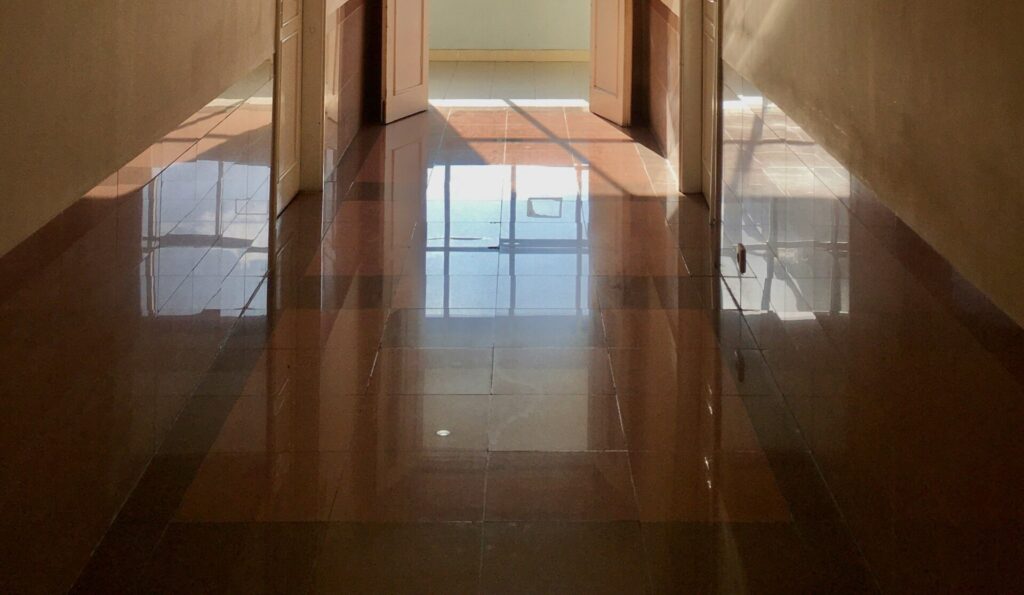
Epoxy flooring is an ideal solution for commercial workshops seeking durability, safety, and visual appeal. Its resistance to chemicals, impacts, and wear makes it perfectly suited for demanding workshop environments, while its customizable appearance can enhance your professional image. Whether for automotive repair, manufacturing, or other workshop applications, epoxy flooring offers exceptional performance with minimal maintenance requirements.
The benefits of epoxy flooring for workshops are clear:
- Superior durability to withstand heavy equipment and high traffic
- Chemical and stain resistance for easy cleanup of spills
- Customizable non-slip surfaces to improve safety
- Attractive, professional appearance with numerous design options
- Low maintenance needs for long-term cost savings
By investing in professional installation and following straightforward maintenance procedures, workshop owners can enjoy a high-performing, long-lasting floor solution that supports productivity and safety for years to come. If you’re looking to upgrade your workshop flooring, epoxy coatings offer an unmatched combination of durability, functionality, and aesthetics.
Consider how epoxy flooring could transform your specific workshop space and operations. Consult with an experienced epoxy flooring contractor to explore options tailored to your unique needs and unlock the full potential of your commercial workshop environment.
Contact EB3 Construction today to learn more about epoxy flooring solutions for your workshop or industrial facility.

